Tom's Hardware Verdict
For a reasonable price, the LG 27UK850 performs as well as the best Ultra HD displays we’ve reviewed, with strong gaming performance and accurate color calibration for professionals.
Pros
- +
Excellent clarity
- +
Good SDR contrast
- +
HDR10 support
- +
FreeSync
- +
24p cadence support
Cons
- -
No DCI-P3 color
- -
60Hz refresh limit
- -
Image adjustments not possible in HDR mode
Why you can trust Tom's Hardware
Features & Specifications
In the not-so-distant past, monitors came in one basic flavor – 60 hertz (Hz) business screens with a basic list of features and adequate performance. As new technologies enabled more accurate color and better video processing, distinct categories appeared. Today, the divide between gaming and professional displays is significant, and both genres carry premium price tags. But many users need a monitor that can do everything well. LG attempts to answer that call with the 27UK850, a 27-inch, in-plane switching (IPS) panel with Ultra HD resolution, FreeSync and HDR10.
The 27UK850 isn’t as sharply focused as the dedicated gaming screens we’ve reviewed lately. And in its role as a professional display, it leaves out a few key features. Though it sports Ultra HD and HDR10 (which uses the wide-gamut Rec. 2020 color space, 10-bit color and the SMPTE ST 2084 transfer function), it doesn’t have extended color. Its native gamut is sRGB; however, it does a good job of simulating extra saturation when presented with a high-dynamic-range (HDR) signal.
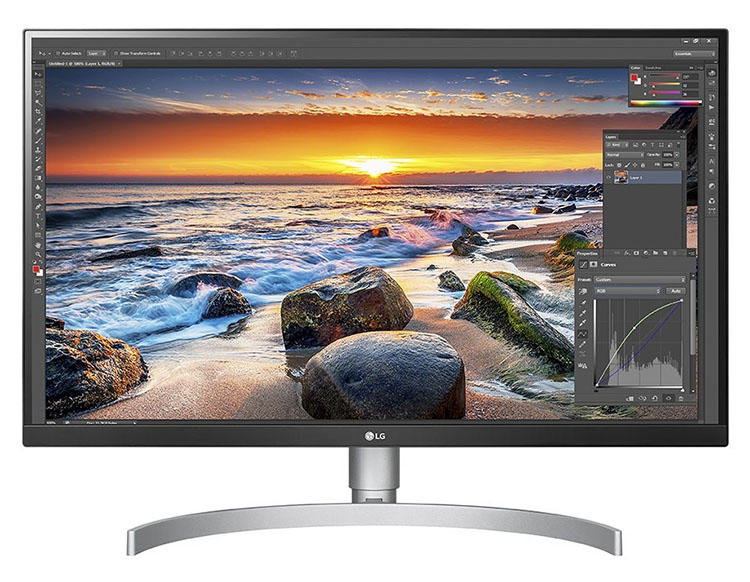
Our HDR tests showed the monitor’s capable of just over 400 nits peak in HDR mode. That provides a decent effect, but it won’t dazzle quite like a full-array backlight model. The 27UK850’s backlight is a white LED arrayed at the edge, which keeps the price at a reasonable level but eliminates the advantages of zone-dimming. At this writing, the 27UK850 sells for under $650, which makes it competitive with other 27-inch Ultra HD monitors that don’t offer gaming features or HDR.
The 27UK850 is an attractive package for both gamers and professionals and just might be the perfect monitor for someone with no room for compromise.
Specifications
| Panel Type & Backlight | AH-IPS / W-LED, edge array |
| Screen Size & Aspect Ratio | 27 inches / 16:9 |
| Max Resolution & Refresh | 3840 x 2160 @ 60HzFreeSync - 40-60HzDensity - 163ppi |
| Native Color Depth & Gamut | 10-bit (8-bit+FRC) / sRGBHDR10 |
| Response Time (GTG) | 5ms |
| Brightness | 350 nits |
| Contrast | 1000:1 |
| Speakers | 2x 5w w/ Maxx Audio |
| Video Inputs | 1x DisplayPort 1.22x HDMI 2.0, 1 x USB-C |
| Audio | 3.5mm headphone output |
| USB | v3.1 - 1 x up, 2 x down |
| Power Consumption | 31w, brightness @ 200 nits |
| Panel DimensionsWxHxD w/base | 24.1 x 17.7-22 x 9.2 inches612 x 450-559 x 240mm |
| Panel Thickness | 1.8 inches / 46mm |
| Bezel Width | Top/Sides - .3 inch / 7mmBottom - .8 inches / 20mm |
| Weight | 13.4lbs / 6.1kg |
| Warranty | Three years |
The 27UK850 isn’t as sharply focused as the dedicated gaming screens we’ve reviewed lately. And in its role as a professional display, it leaves out a few key features. Though it sports Ultra HD and HDR10 (which uses the wide-gamut Rec. 2020 color space, 10-bit color and the SMPTE ST 2084 transfer function), it doesn’t have extended color. Its native gamut is sRGB; however, it does a good job of simulating extra saturation when presented with a high-dynamic-range (HDR) signal.
Our HDR tests showed the monitor’s capable of just over 400 nits peak in HDR mode. That provides a decent effect, but it won’t dazzle quite like a full-array backlight model. The 27UK850’s backlight is a white LED arrayed at the edge, which keeps the price at a reasonable level but eliminates the advantages of zone-dimming. At this writing, the 27UK850 sells for under $650, which makes it competitive with other 27-inch Ultra HD monitors that don’t offer gaming features or HDR.
The 27UK850 is an attractive package for both gamers and professionals and just might be the perfect monitor for someone with no room for compromise.
Product 360
The stand and panel ship in three pieces and can be assembled without tools. The base is satin-finished cast aluminum, while the upright is plastic with a metal core. It snaps onto the back, or you can use your own mount with the provided 100mm VESA lug nuts. You’ll need to source your own bolts though. The included cables and external power supply are white to match the monitor and consist of one each of DisplayPort, HDMI and USB-C. You also get a clip that snaps onto the upright for cable management and CD with the user manual and desktop management software.

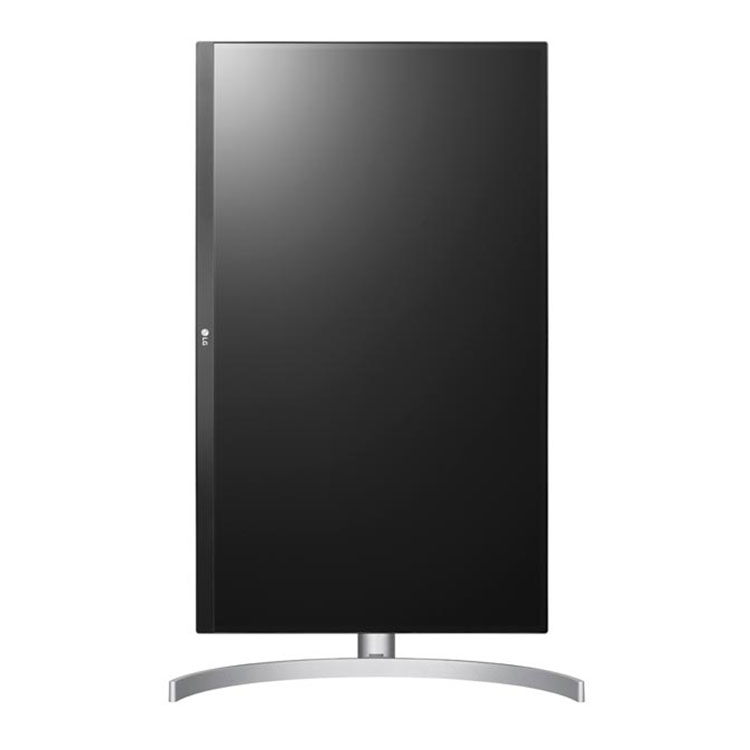
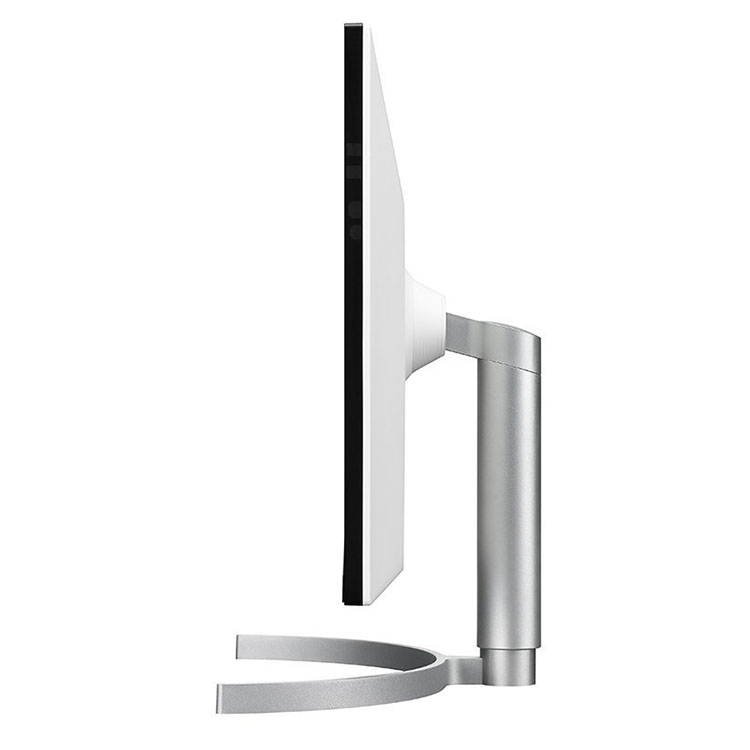
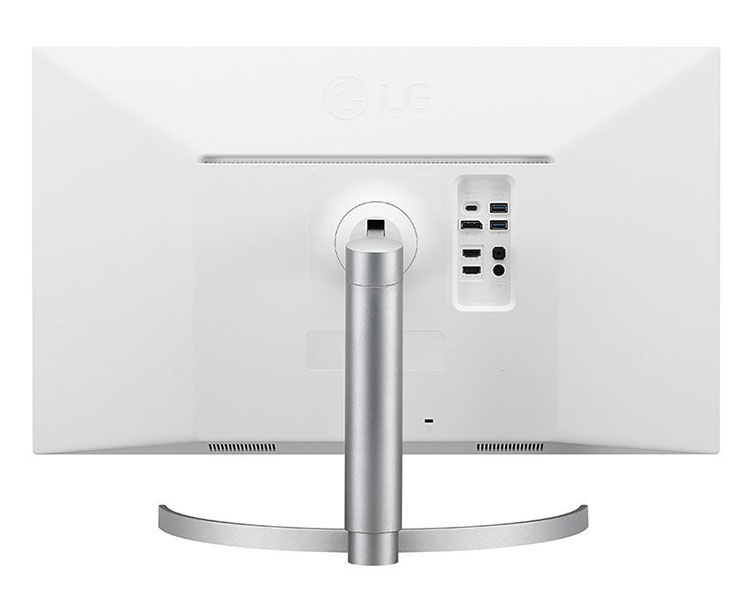
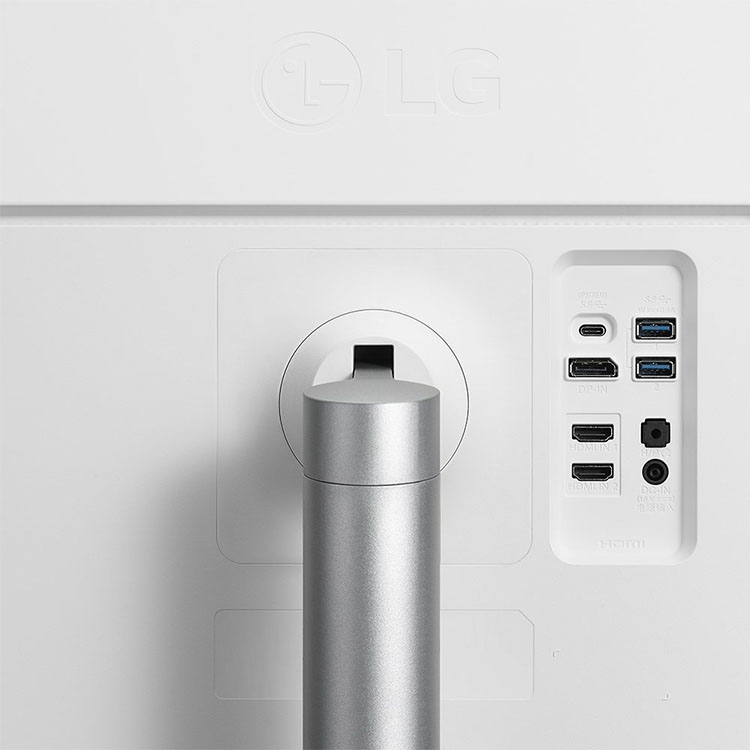
The 27UK850 has a flush-bezel design with a thin, 7mm frame around the top and sides of the display. A 20mm band crosses the bottom, which features a silk-screened LG logo. The monitor’s only control is a tiny joystick located underneath the center of the panel. It’s super-convenient and works intuitively; you’ll be zipping through the on-screen display (OSD) in no time, thanks to its excellent design and responsive operation. The joystick also glows a soft white when the monitor is on.
The anti-glare layer managed reflections well with no grain or distortion. The image was bright and sharp with excellent color saturation. Our sample had no signs of bleed or glow around the edges.
The stand is a minimalist design but much more solid than it appears. A slender upright telescopes through a 4.3-inch height adjustment. There’s also a 90° portrait mode, along with 20° back tilt and 5° forward. Oddly, there is no swivel function. You’ll have to turn the entire product around if you want to angle the screen sideways.
The back is all white, broken only by a thin grill line across the top. Sound fires out of two 5-watt speakers from the monitor’s bottom and benefitted from MaxxAudio tuning. In trying out the sound quality, we found it was a cut above the norm with decent bass and midrange. Highs were clean and distortion-free. Headphone users can employ the single 3.5mm jack around back.
The side profile is slimmer than most, measuring less than 2 inches. There are no USB ports on either side, but there are two downstream jacks on the rear panel. All connections face the rear and are easy to find, either visually or by feel. One DisplayPort and USB-C, along with two HDMI 2.0 ports carry video signals. HDCP 2.2 content protection ensures compatibility with the latest Ultra HD source components.
MORE: Best Gaming Monitors
MORE: How We Test Monitors
MORE: All Monitor Content

Christian Eberle is a Contributing Editor for Tom's Hardware US. He's a veteran reviewer of A/V equipment, specializing in monitors. Christian began his obsession with tech when he built his first PC in 1991, a 286 running DOS 3.0 at a blazing 12MHz. In 2006, he undertook training from the Imaging Science Foundation in video calibration and testing and thus started a passion for precise imaging that persists to this day. He is also a professional musician with a degree from the New England Conservatory as a classical bassoonist which he used to good effect as a performer with the West Point Army Band from 1987 to 2013. He enjoys watching movies and listening to high-end audio in his custom-built home theater and can be seen riding trails near his home on a race-ready ICE VTX recumbent trike. Christian enjoys the endless summer in Florida where he lives with his wife and Chihuahua and plays with orchestras around the state.
-
mlee 2500 I want my 4K Pixels spread across a ~30" screen.Reply
Game details tend to scale WAY too small at 4K on a 28" or smaller screen, and 2K isn't ENOUGH pixels on a 30" or 31" screen.
I have to wait though because I also want it at at least 75Hz (preferably 90...more then enough for me). Hoping we see that (and HDMI 2.1, though DisplayPort 1.4 suffices) sometime in 2019.
Oh yeah...AND I want a relatively square aspect ratio, not a damn ribbon....4:3 preferably, 16:9 at worst. I don't need to throw my neck out or feel like I'm looking through the slit in some dark ages helmet.
While I'm stating what should be obvious to manufactures, why not make it TRUE 4K at 1.9:1 (Cinema 4K).